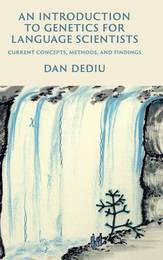
|
An Introduction to Genetics for Language Scientists: Current Concepts, Methods, and Findings
Hardback
Main Details
| Title |
An Introduction to Genetics for Language Scientists: Current Concepts, Methods, and Findings
|
| Authors and Contributors |
By (author) Dan Dediu
|
| Physical Properties |
| Format:Hardback | | Pages:300 | | Dimensions(mm): Height 229,Width 150 |
|
| Category/Genre | linguistics
Genetics (non-medical) |
|---|
| ISBN/Barcode |
9781107001299
|
| Classifications | Dewey:599.93502441 |
|---|
| Audience | | Professional & Vocational | |
|---|
| Illustrations |
12 Tables, black and white; 1 Maps; 50 Halftones, unspecified; 1 Line drawings, unspecified
|
|
Publishing Details |
| Publisher |
Cambridge University Press
|
| Imprint |
Cambridge University Press
|
| Publication Date |
12 March 2015 |
| Publication Country |
United Kingdom
|
Description
During the last few decades we have discovered enormous amounts about our genomes, their evolution and, importantly for linguists and language scientists, the genetic foundations of language and speech. Accessible and readable, this introduction is designed specifically for students and researchers working in language and linguistics. It carefully focuses on the most relevant concepts, methods and findings in the genetics of language and speech, and covers a wide range of topics such as heritability, the molecular mechanisms through which genes influence our language, and the evolutionary forces affecting them. Filling a large gap in the literature, this essential guide explores relevant examples including hearing loss, stuttering, dyslexia, brain growth and development, as well as the normal range of variation. It also contains a helpful glossary of terms, and a wide range of references so the reader can pursue topics of interest in more depth.
Author Biography
Dan Dediu is Senior Investigator in the Language and Genetics Department at the Max Planck Institute for Psycholinguistics in Nijmegen, The Netherlands.
Reviews'How does our genetic make-up contribute to our language ability? This book provides language scientists with a much needed introduction to genetics, providing the necessary background to think intelligently about this question.' Morten H. Christiansen, Co-Director of the Cognitive Science Program, Cornell University, Senior Scientist, Haskins Laboratories, and External Professor, University of Southern Denmark
|